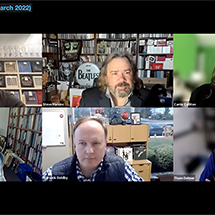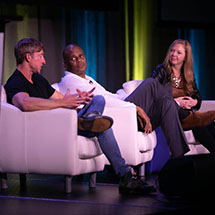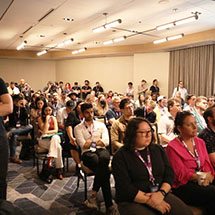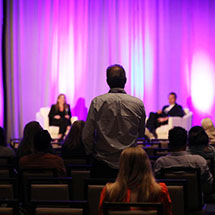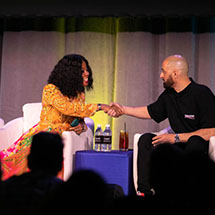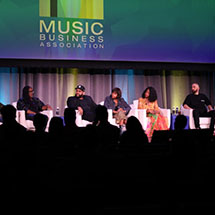
[Keeping Tempo With Music Biz] — Improving User-First Music Search with AI-First Tech: Interview with Einar Helde of AIMS

We are now past the early days of AI adoption in the music industry, and have seen some of the ways this new tech can be proactively applied to existing processes in support of the humans working in music. One such area is music search, which has become daunting in the face of thousands of new songs being uploaded to DSPs every day. In our latest interview, we talk to AIMS Co-Founder & CCO, Einar Helde about his platform’s human-first approach to AI-powered music search, how it empowers users to derive value from their catalogs, the future of AI-based applications in music, and much more!
Music Biz: Can we start by discussing AIMS’ origins: what led you to pursue establishing AIMS as an “AI-First” music tech company?
Einar Helde: We set out to help music professionals find better music drastically faster, which only AI could achieve. We wanted to help all music companies get value out of their catalogs, by finding the best songs whenever they need them.
The goal was to solve daily time-consuming challenges. Most briefs include references or specific criteria, so we built AIMS to find music based on sound and feel, not tags — using any reference with Similarity Search or natural language with Prompt Search.
But getting to where we are now — powering searches for the biggest music companies as well as smaller independent teams — took being not just AI-first, but also user-first.
Being AI-first and having great tech isn’t enough. Using it has to feel natural, otherwise you’re just giving users more work. Because we spent years doing the searching ourselves, we designed AIMS to fit real-world workflows. Our industry ties led to AIMS having clients even before launch, and their feedback helped us perfect the details.
Music Biz: What considerations were necessary when starting up AIMS? How did you address the concerns around ethical use & transparency in AI tech during the ramp-up to AIMS’ launch?
EH: When people hear AI in music, they usually think generative. But AIMS is an assistive AI. We’re not replacing people; we’re helping them do more. AIMS is not a “savings tool”; it’s a revenue-generating tool that empowers creativity by finding the right music easily.
From the start, we had some partners who let us use their music for training, not just to support us but because they saw the benefits our AI would bring. That dataset of tracks has since grown to include millions of diverse recordings, all fully licensed.
Music Biz: AI tech has a number of practical applications in the music industry. For one, the sheer number of new tracks published every day has created problems for music search & discovery. What successes have you seen your technology have in that space?
EH: The advantage of using AIMS is that we search across the entire catalog every time, in every search, and our core searches aren’t reliant on metadata. You will always find the best tracks regardless of composer, release date or other biases.
Our clients say that AIMS makes their catalog feel bigger because it finds tracks they’d forgotten about or didn’t know they had. It also shifts the norm of prioritizing new releases, which has labels and publishers losing a lot of hidden gems. With AIMS, the release date doesn’t matter — it’s only about which track sounds like what you need.
As a result, you’re tapping into more revenue opportunities. And that revenue is spread across a more diverse part of the catalog, including versions and submixes. A submix can often be very different from the main recording, it can even feel like a different genre, which means it can be a perfect fit for totally different searches. With AIMS, no track goes unnoticed, and no opportunity is missed.
Music Biz: This brings up the issue of music metadata: while there have been major strides in standardizing and cleaning up the music metadata supply chain, there are still issues with proper data logging & implementation. How has the use of AI tech helped to overcome issues with catalog music data?
EH: Factual metadata like copyright information is not directly related to AIMS, so we leave that up to other AI tools. What I can speak on is creative metadata.
AIMS offers auto-tagging that tags an entire catalog instantly, with absolute consistency. We find it’s a lot easier to clean up creative metadata in-house, so we’ve built our own customizable taxonomy. But we don’t expect it to be a universal standard, and I don’t even think one is needed. Using natural language through Prompt Search is a better way of solving search than tags in most cases.
Rather than hoping for the impossible — everyone using the same approach, having the same understanding of every keyword, and so on — Prompt Search lets you describe what you need, in any language and without worrying about terminology, and finds music that captures your description. No tags, no biases, just sound.
Music Biz: Another music subset that’s seen benefit from AI implementation is sync licensing. In what ways has AI impacted the music licensing space, and how have you seen it improve the workflow for sync teams?
EH: AIMS co-founder Martin and I come from sync, where we did the hands-on work of searching, licensing, and even tagging. We knew exactly what challenges we wanted to solve, how to tell if the solution works, and how helpful it would be.
Today, the sync licensing space is one of AIMS’ main adopters because we’ve tapped into all sync workflows. Our AI-driven searches — Similarity, Prompt and Lyrics — let professionals find tracks using any input: a file, a link, a scene description, a lyrical theme, or a mix of everything. This makes people more creative and efficient.
Lyrics are especially critical in high-value briefs, yet searching them has always been a challenge. With Lyrics Search, we’ve created a way where you can actually search for the meaning of songs, in addition to exact word matches. We even partnered with AudioShake so our clients can get award-winning lyric transcription for all audio files.
With AIMS, you don’t waste time guessing keywords or hoping tracks are tagged correctly. You instantly know if you have a perfect match — or if you don’t, so you can pivot fast. Instead of digging through a catalog for hours, you can quickly find an alternative with the same feel or vibe, even if it’s a different genre or instrumentation.
Everyone who tries it loves it, and sync teams tell us they use it with every search, just in case it results in a less obvious find.
Music Biz: Despite its potential for improving business, the implementation of AI tech has caused friction in normal day-to-day operations in some music business sectors. One such area is that labels & publishers — how might these companies be able to use AI tech to improve, not hinder, their workflows?
EH: Implementing any new tech can cause friction. But if you’re flexible and clear, it can be easy. After years of perfecting the process, we can get people set up within a couple of days — in whatever way works for them.
We’ve built our technology as an API so it can be put into existing workflows, and AIMS is also available on all key catalog management platforms or via our AIMS App — a minimalistic web platform where you can search your catalog using all AIMS features.
For labels and publishers, the biggest challenge is tied to their development priorities and how fast they can implement things. This is where our AIMS App helps — teams can access our tech there, right away, while they implement it into their own systems.
We also keep our documentation crystal clear, talk to clients openly at every step and, if needed, we help clean up data using our AI-driven tagging. AIMS’ whole goal is to make you more efficient, and we think that should include the implementation stage.
Music Biz: Wholistically, do you feel the initial widespread concerns about the dangers of using AI tech in music have been addressed? And from your perspective, what work still needs to be done to make the technology work in harmony with a human workforce?
EH: New tech always comes with concerns about how it will affect humans. The reality is, most people already use AI daily through their phones, laptops and so on — but it’s the fast, industry-wide shifts that feel scary.
If AI threatens to replace an entire workforce, of course it’s concerning. I see AI’s value as a supportive tool for the music industry, not a replacement.
If it can empower people, support creativity, uncover great music, then it’s a win. Our goal should be helping people — and just because we can go beyond that doesn’t mean we should. For example, AIMS helps you build playlists by speeding up curation, but we keep your music taste in the driver’s seat. You decide what songs you add. We could automate the process entirely, but we don’t want to. That’s not what we do.
Music Biz: We’ve talked through what present-day AI tech applications exist in our industry, but where do you see it evolving and iterating in the near future?
EH: As music releases continue to flood the industry, advanced search, discovery and recommendation tools won’t just be helpful — they’ll be essential. Search tools will become an invisible enabler. Music will be discovered because of search, not despite it.
We feel a responsibility to lead the way, and the AIMS approach is to keep search democratic and fair. By finding music based on audio, every track has an equal chance of being found. The playing field is leveled; the only thing that matters is the music itself.
Music Biz: Both in and out of the AI space, what trends or technologies do you see defining the near and distant future of the music industry?
EH: Technology is now essential but at its foundation, the industry still runs on great music and talent — it’s just reached unprecedented volume. The only way to meet demand without sacrificing quality is through smarter tech. That’s the future we’re already in.
But I expect pushback against the trend of pushing out too many new things too fast. The pendulum always swings, and artists who can afford to take risks will stand out by doing the opposite — whether that’s dropping one song a year or making releases more exclusive, like Taylor Swift delaying albums on DSPs.
The question is: What happens to artists in the middle? Will breaking through get easier or harder? I don’t know for sure, but I do know democratizing music discovery will be crucial. Tools like AIMS level the playing field so great music isn’t lost in the noise.
I think true artistry always shines through. It’s like photography — everyone can take good pictures now but if you’re a professional, you’re taking great pictures. And people can be counted on to recognize and appreciate greatness, as long as they can find it.
You can read past “Keeping Tempo” articles via the portal linked here. And, stay tuned for more insightful discussions from our members and partners from across the industry!

